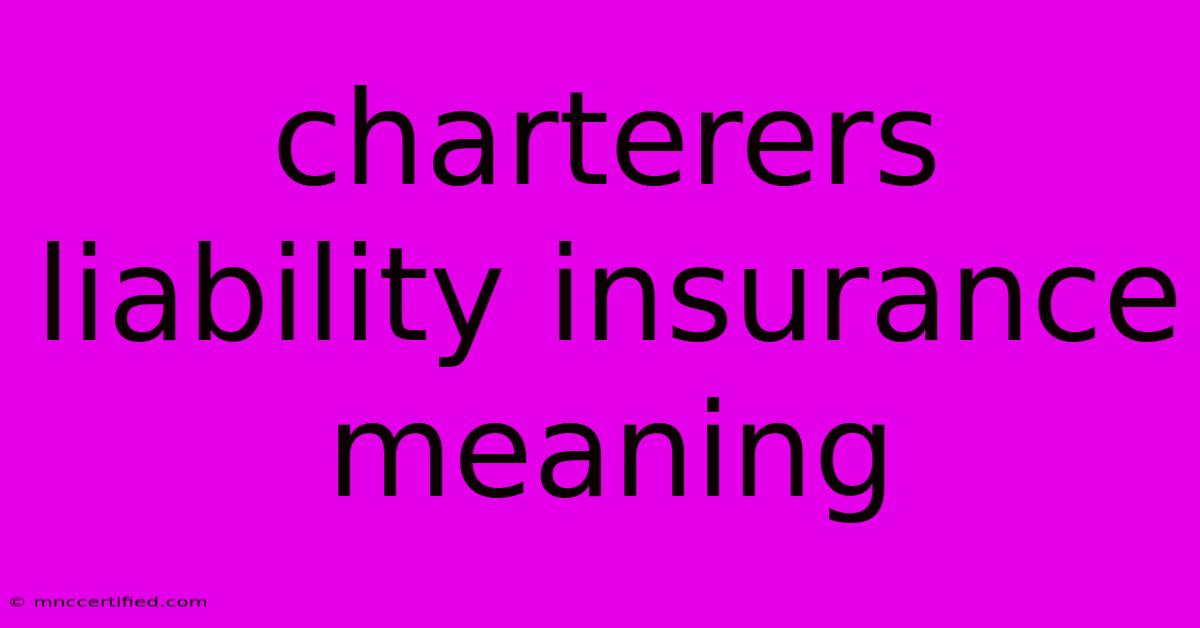Charterers Liability Insurance Meaning

Table of Contents
Charterers Liability Insurance: Protecting Your Business in the Maritime World
In the maritime industry, charterers play a crucial role in transporting goods and resources around the globe. They often rent vessels from owners for specific periods, assuming responsibility for various aspects of the journey. However, this responsibility also comes with potential risks and liabilities. This is where charterers liability insurance comes into play, acting as a vital safety net for businesses operating in the maritime sector.
What is Charterers Liability Insurance?
Charterers liability insurance is a specialized type of coverage designed to protect charterers against financial losses arising from legal liability during the charter period. This liability can stem from various incidents, including:
- Damage to the chartered vessel: This could include accidents, collisions, groundings, or even wear and tear during the charter period.
- Injury or death of crew members: Charterers can be held liable for accidents involving the crew, such as those related to negligence or unsafe working conditions.
- Pollution damage: If the chartered vessel spills oil or other hazardous substances, charterers can be held liable for environmental damage and cleanup costs.
- Cargo damage or loss: Charterers may be responsible for damage to cargo during transportation, particularly if it's caused by negligence or improper handling.
- Third-party claims: Charterers can also be liable for injuries or damages sustained by third parties, such as those on other vessels or onshore.
Why is Charterers Liability Insurance Important?
Charterers liability insurance is crucial for several reasons:
- Financial protection: It safeguards charterers from significant financial losses that can occur due to legal claims.
- Legal defense: Insurance policies typically include legal defense costs, covering lawyers and expert witnesses in the event of a lawsuit.
- Peace of mind: Knowing you have adequate coverage can ease worries and allow you to focus on your business operations.
- Compliance requirements: Some charter agreements may require charterers to have specific liability insurance coverage.
Key Coverage Components of Charterers Liability Insurance
Charterers liability insurance policies typically include various coverage components, such as:
- Hull and machinery insurance: This covers damage to the chartered vessel itself, excluding wear and tear.
- Protection and indemnity (P&I) insurance: This covers third-party liability claims for injury, death, pollution damage, and cargo damage.
- War risks insurance: This provides coverage for losses related to acts of war, terrorism, and piracy.
- Strike risks insurance: This covers losses arising from strikes, labor disputes, and other industrial actions.
How to Choose the Right Coverage
Choosing the right charterers liability insurance policy requires careful consideration. Factors to consider include:
- Type of charter: Different types of charter agreements (e.g., bareboat, time charter, voyage charter) may have different liability exposures.
- Vessel size and type: The size and type of vessel being chartered will influence the level of risk and insurance premiums.
- Trading area: The geographical area where the vessel will operate can affect risk factors and insurance rates.
- Cargo type: The nature of the cargo being transported will influence potential liability risks.
Consult with a specialized maritime insurance broker who can assess your specific needs and recommend suitable coverage.
Conclusion
Charterers liability insurance is an essential tool for safeguarding your business in the maritime sector. By understanding the risks involved and securing adequate coverage, charterers can mitigate financial losses and operate with confidence, knowing they are protected against unforeseen liabilities. Remember, investing in comprehensive insurance is not an expense but a wise investment in the long-term security and success of your business.

Thank you for visiting our website wich cover about Charterers Liability Insurance Meaning. We hope the information provided has been useful to you. Feel free to contact us if you have any questions or need further assistance. See you next time and dont miss to bookmark.
Featured Posts
-
Putin Reacts To Trumps Election Victory
Nov 09, 2024
-
Kansas Defeats Unc Fan Reactions And Analysis
Nov 09, 2024
-
Seed To Table A Maga Connection
Nov 09, 2024
-
Doordash Insurance Claims Phone Number
Nov 09, 2024
-
Scherzinger Issues Apology Over Brand Remark
Nov 09, 2024